VOICE OF EXPERIENCE
ANNA HAZARE
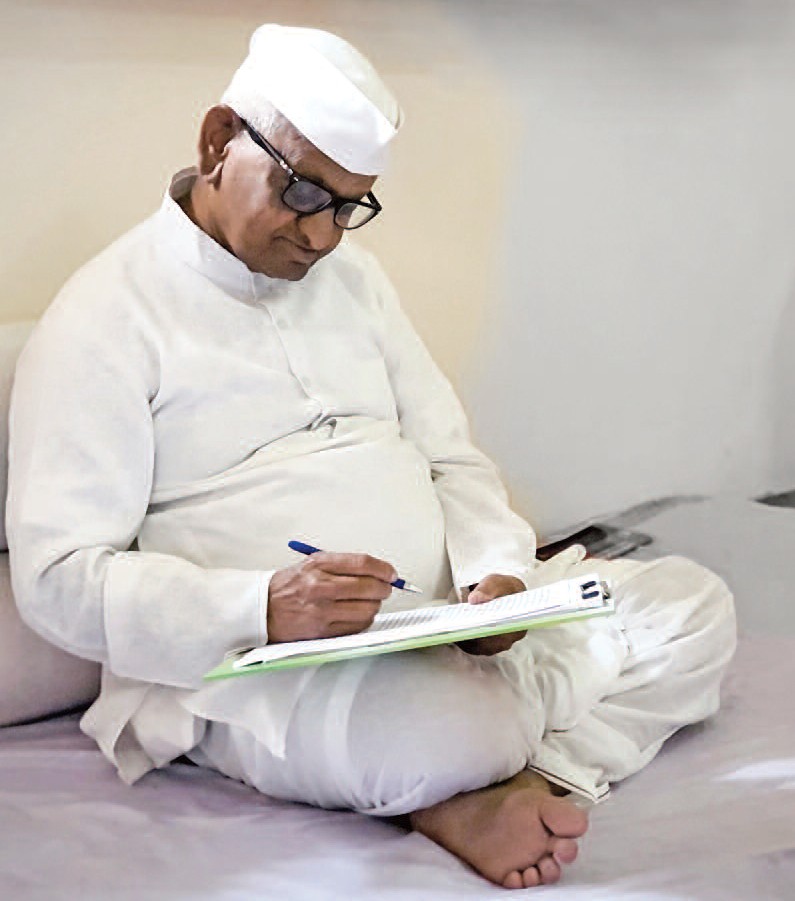
Early Life
I was born on 15th June, 1938 at Bhingar Village near Ahmednagar. Although I belong to Ralegan Siddhi Village which is tucked in Parner taluka of Ahmednagar District, my paternal grandfather worked as a sweeper in the British Army in the Bhingar Cantonment. Thus, our entire family used to stay with him in Bhingar. I was born here and being the first child of my generation, in the family, I was highly pampered.
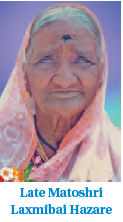
In Bhingar, I studied in the Late Khushroo Irani Brothers School up to Std. IV, after which my maternal uncle took me to Mumbai for further studies. My mother instilled good values in
me. Although she was illiterate, she knew how to build relationships with people around and how to be a good human being. Hence, she used to feed me with nuggets of human values since I was a baby; which comprised not to tell lies, not to steal; not to be shrewd; but, to always make efforts to do good for the people; if you are unable to do good for them; at least do not do ill to others, she would say. These values had a great influence over me all my life. Values, which are entrenched deeply within me, prove that when a value-based foundation is laid in your childhood, it has a strong influence in your life.
When I was in Mumbai in 1962, China suddenly attacked India. Overconfident that we have no enemies, India did not make adequate military preparations, as it should have. Since China attacked unexpectedly, a large number of our soldiers were killed and a lot of country’s wealth was lost. Hence, the Indian government had appealed to the youth of the country that it required soldiers in the Army, Navy and Air force. Since my childhood I was staunchly patriotic thanks to the values instilled by my mother. That’s how I applied and joined the Army in 1963. After I joined the Army, one thought always baffled me. When you are born; you come emptyhanded and when you die; you leave empty-handed; but in the entire lifetime, man is seeking for himself and craving for everything to be “mine.’’ Then what does a man live for? He is only chasing the mirage. Even Emperor Sikandar, the world conqueror had to leave the world, empty-handed. He told his people that although I won the world, I’m leaving without taking anything with me.
Why do people live then? What is the purpose of life? I contemplated but could not find any answers. I asked this question to many people but none was able to satisfy my quest. Thus, one day I sat in silence in a corner of the room and thought of committing suicide. If in any case you have to leave this world, empty-handed, then why not leave right now? I had no obstacles in my life, which could have spurred me to commit suicide but because I did not understand the reason why man must go through this life, I decided, why not end it, right now. By sheer coincidence, I saw an attractive photograph of Swami Vivekananda on a book cover, at the book vendor’s stall at the Delhi Railway Station. I bought it because I found the cover page, attractive.

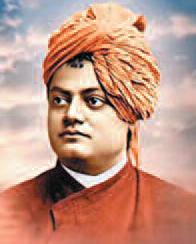
I started reading and found the thread of life. I started reading his other books but it was a bit challenging for me to understand his philosophy; particularly not for a not-so educated person like me. However, through his words, I comprehended that man indulges in the possessiveness of materialistic wealth, in his chase of happiness. Man does not want temporary happiness; he wants eternal happiness. For example, to get the happiness of a good sleep a man sleeps in an air-conditioned room, still cannot do so without sleeping pills. Swami Vivekananda says that happiness can’t be sought from outside; it has to come from within. The happiness you get from outside is momentary pleasure. Serving the poor and the sick and attending to those who have gone astray is the true worship of God. Man receives endless joy through such service; however this service should be like an offering to God and; without any expectations. Otherwise, you can enjoy its benefit only temporarily. That, you cannot get endless happiness is what I gathered from Swami Vivekananda’s teachings. To get happiness, many people visit temples. There is no harm in paying obeisance – even I have placed a garland of tulsi on Sant Dnyaneshwar’s Samadhi; but while I pursue my mission, I never worry about success or failure or about what benefits I will reap. Working without expectations and relentlessly is my only mantra.
However, sometimes it is also observed, that while the person has closed his eyes to pray to God, his other eye is eyeing for someone’s land and how he can grab it or he might be thinking of the one month loan, which he has yet to receive. With such thoughts, it is not possible to get long lasting happiness. God is hungry for his devotees’ pure sentiments; some people worship, forgetting themselves and are totally engrossed in their devotion. This is true worship. Swami Vivekananda’s philoshophy of life and Mahatma Gandhi’s call for ‘go back to villages’ appealed to me so much that at the age of 25 years, I decided that I would devote my entire life to the service of the village, society and the nation, with utmost selflessness. ‘Karmanyevadhikaraste ma faleshyu kadachan’ (work without expectations) became the mission of my life.
Army Life
I joined the Army in 1963 and within two years, that is, in 1965, the enemy, that is Pakistan, attacked, by air, at the Indo-Pakistan border
of Khemkaran. In that assault, all my colleagues were martyred. Twenty five to thirty bullets hit the vehicle which I was driving because of which the front tyres burst. Three bullets hit the windscreen but I was saved. I saw blood all around me and Ithought that the fact that I was saved and all my colleagues around me were killed, it implied that God wants me to get something done through me. Before that, I had read books by Swami Vivekananda and Mahatma Gandhi who influenced my thoughts towards doing social good. Therefore, at ground zero at Khemkaran on the Indo-Pak border, where this incident took place, and where I was the only survivor, I made a pledge.I took this escape from death as rebirth and vowed to devote this new lease of life to the service of my village, society and my nation. The family’s financial condition was very modest. With such a backdrop, if I were to leave the Army and come back to the village to serve the village and society, who would bear the burden of my livelihood? My family members or some well-wishers would have to bear the brunt. Since it was only two years that I served in the Army, I was not eligible for pension. Hence, it seemed a bit difficult to leave the Army and plunge into social reform for the betterment of my village and nation. So, I decided that I should return home only when I would have earned livelihood, which is through pension, eligible, after putting in 15 years of service. So, along with the decision of serving the Army for 15 years, I also pledged to remain a bachelor, for marriage meant that my first priority would be attending to the family’s daily needs and children upbringing. That would adversely affect my mission. This pledge which I took on the Indo-Pak border at the age of 25 years continue be strong even in my ripe age of 82 years. I feel this is a blessing showered on me by the Almighty. It is not easy to remain a bachelor and pursue social service, but God has been kind to me and without tainting even a wee bit of my character, I gained the strength of self-restraint and selfdiscipline.
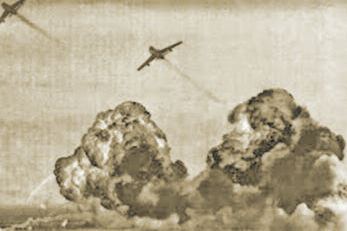
Airstrike 1965 Khemkaran Battle
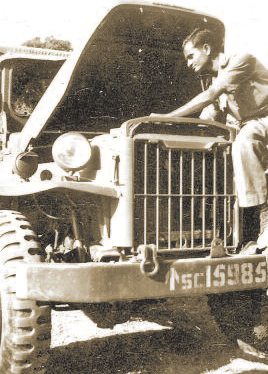
Bullet Hit Windshield while in Army
During my tenure in the Army, I got the opportunity to be posted in Punjab, Himachal Pradesh, on the border of Sugar Sector (Poonch), Sikkim, Bhutan, Assam, Mizoram, Tejpur, Dhawang, Tawang, West Bengal and Kashmir. In my 12 years of service, I was stationed for six years in extreme cold and icy conditions, at the height of 14,000ft. Thus, I could witness the geographical and social situation of the Himalayan side, West Bengal, Assam,
Nagaland, Sikkim, Bhutan, Himachal and Uttarakhand. This enhanced my life’s experience.
In some areas of Himachal Pradesh, diesel solidifies in the vehicle’s fuel tank, like thick ghee. At such times, we had to create heat under the diesel engine, waiting for the fuel to melt. Once it did, we would drive it down the slope for about two to three kilometres after which it would start. When on ice, we had to tie chains to the tyres so that the vehicle doesn’t skid. I’ve witnessed these while in the Army unique situations.
Our nation runs by law. Despite military laws being different from the Parliament laws, I used to take up various issues of jawans and fight for their causes with the high authorities of the Army. During Company Durbars and Battalion Durbars I used to always present jawans’ issues. Hence, I was known as ‘Shastri’ to everyone from the soldier to the
highest officers.
Earlier, Kings and Emperors used to hold special durbars which were grievance cells for their subjects and issues would be successfully addressed. Such durbars continue to be held in the army too, where I would take up issues with the authorities. Sometimes, when I challenged them pointedly, I used to suddenly get transferred to the coldest region of the Himalayas. However, I was prepared to go anywhere as I had taken a pledge to serve the nation. Once, I escaped from an assault in Mizoram. My 12 year tenure in the Army was a roller coaster ride. I would need an entire book to pen down my experiences. In fact, it was so tedious that perhaps I would not be able to pen it in words. However, one thing is for sure. If a soldier decides to overcome the challenges, the hardships turn into achievable goals. That’s a lesson I learnt from the Army.
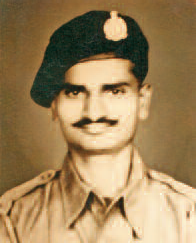
Army Photo

Khemkaran Border

In the snow area
The turning point of my life came in 1965 during the Khemkaran battle with Pakistan. It was God’s will that I escaped death while all my other colleagues were killed. I contemplated about God’s role for me on this earth. That’s how I made my goal to only and only selflessly serve the society. Swami Vivekanand says that every person aims at some goal or the other, each day of his life. When one goal is achieved, he thinks of the next one and so on. Setting of goals is an endless pursuit of man and they keep changing. Goals change because man makes them, taking into consideration of those around him and so they revolve around I, me, myself. Man rarely considers serving his village or town, the society or nation, in his goals.Therefore, while pursuing goals, if he encounters difficulties or humiliation, his mind gets fatigued and he then quickly changes his goals. Sometimes, he leaves his job, half-done. That’s because he pursues short-term goals. It is important that every person should chalk out a lifelong goal and mission. Because man comes empty-handed and has to leave this earth, empty-handed; but keeps chasing in the pursuit of owning materialistic possessions. What is the sense of such life, he should ask himself. If social activists form their goal of life to selflessly serve, they will conquer death. Such a person will never cow down to challenges, opposition and humiliation. He will never back out even if death stares at him. This is how he continues to overcome all challenges. Hence, I was totally inspired by Swami Vivekananda who said that man must have a goal.
On the lines of Mahatma Gandhi’s and Swami Vivekananda’s philosophy, I decided at the age of 25 years to relentlessly and selflessly serve my village, the society and my country. In the last 50 years I’ve pursued with my resolve and did not get discouraged with any opposition, challenge or humiliation. Swami Vivekananda says that once you finalise your goal, you can see, which destination your life takes you to. While you are on your journey towards your destination you will be met with obstacles, humiliation and physical and mental stress, but do not stop half-way through; keep walking. Keep walking with such determination that it does not matter if death comes by. While walking towards your destination you will also discover the goal of your life.
When I decided to dedicate my life to my village, the society and my country, I realised that ‘serving’ the people is my destination. This is
because my village was in financial crisis, I was earning a pension of only Rs.15, 000 and there seemed no other financial support around. Many a time, when I used to go to Mumbai to pursue peoples’ issues, I had no money to stay in a lodge so I would sleep overnight in a bus stand with a newspaper laid down, as my bed cover. Once, I went to Dondaicha in Dhule district to buy cows for a poor family. I reached Mumbai at 1.30 am and slept on a newspaper at the bus stand. During my sleep, someone stole my slippers. I waited for the shops to open, bought a pair of rubber chappals for six rupees and then went to the Mantralaya. For public betterment I used to visit Mumbai often. Sometimes I used to have a bath in the sea, change my clothes and then visit Mantralaya to pursue the work. Sometimes, I would not have enough money to go back to my village by bus, so I would take a lift from a truck. Once, I changed myclothes in Azad Maidan. Many a time, I would not have money to have a meal so I would eat chanas. Because Swamiji’s words haunted me – “keep walking without feeling the fatigue in your mind, never mind if death accosts you’’.
Therefore, all my life, without fearing challenges, without being perturbed by any opposition, I have courageously walked, holding death in the palm of my hands. With this approach, development took place in Ralegansiddhi and nearby villages. The model village development in Ralegansiddhi attracted the attention of Maharashtra and across the country. Madhya Pradesh, Odisha, Rajasthan and Hyderabad wanted to replicate our watershed development model and so appointed me as their advisor. Whenever I used to visit these States for meeting with the respective chief ministers, Class A officers of that state would come to the airport to greet me. This would take me down the nostalgic lane when I used to survive on chana for meals and sleep on newspapers in bus stands and now, senior bureaucrats come to the airport to greet me. However, I was not overwhelmed with this honour as, I had no arrogance within me as I had decided my goal – that of selflessly serving people. And I was living the philosophy of ‘Karmanye vadhika raste, ma faleshu kadachanam.’ Hence, I had no expectations of fruits of my efforts or no attachment of success or failure.
Sometimes you have to gulp failure, because it does come now and then. We should have the strength to sustain that failure. However, those who dedicate their lives to the society need to observe some regimen. They should follow a code of conduct and have pure thoughts and their character should be taint-free. Life should be clean of any blemish as it makes you uncomfortable and you can lose
your sleep also, for which you then reach out to sleeping pills. We have seen so many such cases and the stark truth is that no one gives weight to your opinion, if your character is tarnished. Because people can see through your bad deeds, even if they cannot see how their bad deeds have adversely affected others. Hence, your personality should be unblemished; with pure thoughts, pure morals, untainted character and a life of sacrifice. A life of sacrifice is the rich cultural heritage of our country.
Our ancient saints and sages, since thousands of years, have time and again, reminded us that sacrifice is necessary if you have to do good for the village, the society and the nation. To give you a sterling example of sacrifice, if you want to see a well-studded maize corn on the corn fields, one corn has to bury itself in the ground and sacrifice its existence. If it doesn’t, how can you get to see the healthy maize corn? Hence, for the larger good of the village, society and the nation you have to become that single seed which will bury itself A corn filled with grain in selfless service and sacrifice. Some maize corns think as to why should they bury themselves into oblivion when they have materialistic pleasure like a car, a mansion and all other materialistic pleasures? They are perhaps ignorant that those who do not bury themselves are churned to nothingness in the flour mill. The seed that is buried is never destroyed – it creates thousands of new corns. Sant Tukaram has said ‘eka beej kela naash. Mag bhogile kanees.’ I took the garb of a seed at the age of 25 years and decided to bury myself in serving the society. Today, the fruition is colossal. About 12 lakh visitors have come from different states and across the seven seas to see for themselves the model watershed development of Ralegan Siddhi. Four of them have done their Phd based on this model & 2 more are still doing Phd.

A Corn filled with Grain
Activists need mental strength to bear humiliation. When you work for peoples’ issues you encounter challenges, difficulties and humiliation but every time I faced any of these, Swami Vivekananda’s words would ring in my years – keep walking, don’t stop. Walk to the
extent that it doesn’t matter even if death comes by. If you work with a mission and selflessly, without fearing death, even an ordinary social worker, without having any money can successfully work for the village, the society and the nation. My experience has proved so. Failure comes to an activist who fears death and is afraid of opposition, obstacles and challenges and stops half-way. No one would listen to a leader who only talks but does not walk the talk. The wise say that action is stronger than speeches. People can easily read through a leader’s credibility. From the beginning, I never gave lectures as I was not too comfortable with oratory. Sant Kabir says, “kathani meethi khand see. Kareena vish kee loy. Kathni chhod krani kare toh vish ka amrut hoy.” Just talking is like Khandsari sugar; it is like poison. Instead of only talking, if you show your merit in your actions, then poison turns into sweet nectar.
Reformation of Ralegan Siddhi
When I began development in my village, people used to answer nature’s call in the open. I explained to them that they should not defecate on the roadsides and dirty it as it would increase illnesses in the village. I appealed to them to go in the middle of the farms or behind big trees, but since they were conditioned to sit on the roadsides since many years, they refused to change their habits. My words did not carry any weight as I had newly come into the village and started my crusade. So, I just picked up a bucket and broom and started collecting the human soil.

Village Cleanliness
Steadily, the villagers got the message but it took them 10-12 months to understand and change the habit. Now, the village is very clean which goes to show that you have to lead from the front, instead of just giving lectures. I toiled hard on the ground; so hard, that I didn’t bother about death. Therefore, my words began to carry weight. The village has always treated me as an integral part of their community but I never visited any household. That’s because if I go to a house, then people will perceive discrimination; that I’m favouring only some households. This would stall the integrity and harmony of the village. Villagers closely observe my day-to-day routine – what I eat, where I go, how do I walk, and what do I talk and so on. It is not easy to lead life as a bachelor. People observe
me closely. Their minds are very cunning, sharp and sometimes, they turn backstabbers too. You never know when they will turn Brutus. However, It is because of the blessings showered on me by God, that I’ve lived a life of restraint till today at the ripe age of 82 years. I don’t have an inkling of taint in my character and therefore villagers look up to me.
Therefore, I tell many youngsters who come to Ralegan Siddhi from different parts of the country, that adopting bachelorhood like Anna Hazare is not my message to you. Each one should get married and have a family; but spare one or two hours for the village, the society and the nation, considering it to be one’s large family. I didn’t get married because my financial condition was weak but because I realised that I would not be able to cope up with the responsibility of family upbringing and would have to give up social work. Those who are financially sound should get married and find time out of it for social service. I’ve experienced that although I did not get married, I sure have a family which is beyond the four walls of the house. My village and my country has become my family. Because of my large family, I’ve no sadness unlike in a small family where tensions and misery arise from the attitude of ‘I, me, myself.’ Hence, you should aspire to have a larger family by serving society and the nation, for which the primary requirements are pure thoughts, pure code of conduct, untainted character, spirit of sacrifice and the ability to withstand humiliation.

Guidance to the Youth
The more you have the ability to suffer humiliation, the more you will grow in your mission of service. The reason why there is much opposition to your social campaign is because the status of those against who you are campaigning is lowered. Those who will be at the receiving end of your exposure get hurt the most and therefore oppose you. Some village leaders who are self-styled bosses are afraid that, if they are exposed, they will lose the respect of the people. An honest social reformer always has the good of the people in mind. Hence, the corrupt and the tainted always want to oppose. However, if you have good conduct and an untainted reputation, you don’t have to fear them. Swami Vivekananda has said that if you have all these good qualities then you develop a divine strength within you and nothing can work against you. Because, many well-wishers are with you as they see you as a genuine social activist and so the adversaries are compelled to kneel down. However, if you face opposition, do not answer with your words, but let your actions reveal the truth. Verbal arguments lead to conflicts and ugly, physical fights.

Guidance to the Foreign Tourists
Initially when you get into activism, it can take at least three to five years to establish yourself. I cannot express in words as to how difficult it is to face this period. Village development cannot be done in a hurry, and if done in a hurry, it will not last long. Only that work lasts which is done slowly and steadily. The village development work in Ralegan Siddhi is intact even after 45 years, because it was done slowly and steadily. Generally, it is seen that it takes a decade to hurriedly do village development but as the new generation comes by; changes keep taking place, as they have no idea of the toil done by the founders. But because, work in Ralegan Siddhi was undertaken at a very steady pace, it continues to be in continuity even after 45 years with new generation of youth cropping up every 10 years.
Self-restraint of the mind is very important for the activist. All good and bad things that happen to man are because of his thoughts and if these are reined in appropriately, he gets success. I had made a resolution to remain a bachelor, but when I used drive by the road and see newly married couples, my mind used to try to tempt me. It used to ask me whether I’ve taken the right decision. I used to recall Swami Vivekananda’s thoughts and reply to my mind that I’ve indeed made the right decision. In the Army, there used to a big lunch served for the soldiers and their families. I used to see a husband and wife, with a small child in their arms, having lunch. Again my mind would ask me whether I’ve taken the right decision of staying unmarried. So many times, my mind tried to lure me and trap me into changing my decision, but I would control it and stand by my decision. It is hard to express in words, how tough it is to control your mind. It is more difficult than walking on a sword’s edge. However, it is not impossible, is what I can assure you, from my experience. We have read in mythology about Sage Parashar who undertook strict meditation in the Himalayas but finally his mind stabbed him by making him fall to temptation. Sage Vishwamitra’s mind too betrayed him, despite his tough meditation practice. Hence, it is imperative that a social activist should control his mind and body. Sant Kabir has said, “maan gaya to jane do, mat jane do shareer’’ – do not let your mind deflect with desire and lust. And Sant Kabir says, even if your mind deflects; do now allow your body to fall in the temptation trap; for the mind is very fickle. It is treacherous. You never know when it will perform treachery. I don’t know how to pay gratitude to God, who blessed me with the power of self-control and self-restraint of my mind and body. And therefore, in my 82 years of life, I see a mother or a sister, in every woman. Therefore, I do not carry even an iota of taint in my character and reputation. That’s why I could ably serve my village, the society and my country. If I had had a bad reputation, people would have deserted me. Even though I’ve relentlessly and selflessly worked towards many causes, there are enough people who deride me and try to blame me but they do not have any effect on me. The more pure you mind is, the more joy you get out of your genuine work. The reflection of your truthfulness and purity is seen in the mind and hence you get internal joy.
Achivements & Awards
Today, every person, from the time he wakes up to the time that he goes to sleep, is chasing happiness. That’s because his soul, the seat
of enlightenment, has an aura of happiness; man is attracted towards seeking happiness. He yearns for endless happiness. However, he does not find happiness because he is searching for it in those things that are symbols of unhappiness; all they give is instant pleasures. For example, he is very happy when he buys a Honda car but sad when one of its tyre get punctured. Everything has to perish and behind this loss is intense sadness. When you buy something for your house you are happy and; sad when it is destroyed.
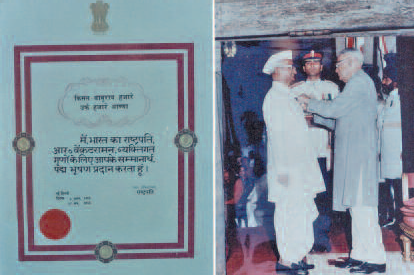
Padma Bhushan Award – 1992
I’ve myself experienced that I have earned cash award prizes from various national and international organisations but have never pocketed any of it. Many government schemes are implemented in Ralegan Siddhi but I’ve not desired to take even five rupees out of it. The President has given me the coveted Padmashri and Padmabhushan Awards. I’ve received crores of rupees of cash prizes from countries like USA, South Korea and Canada but I did not keep that money with me. This goes as corpus for the ‘Swami Vivekananda
Gratitude Trust.’, a social trust. The money is used for the service of the people. I stay in a 10ft x 12ft room at the Sant Yadav Baba Temple. A plate to eat and a bedding to sleep is all that I have to lead my life. I have farm fields, my mother and my brother in the village but I have not visited them since the last 45 years. I’ve a sister in Mumbai but I don’t know where she stays. It is my personal observation that the happiness that I enjoy is in multiples of what any millionaire would have despite his wealth. These are not some casual observations, but pearls of wisdom through my own experience.
Today, many people stay in air-conditioned rooms but pop sleeping pills because they do not get sleep. There used to be just utensils and pots made of mud in the houses of saints. They have scripted ‘‘anandachya dohi ananda taranga’’. This means, their happiness is endless. This happiness that they got; manifested from within; not from any outside pleasures. When, in your social service, you selflessly work to alleviate the suffering of the poor and you see contentment on their faces, you get immense happiness. I was born a
Brahmin, with empty hands. On the 12th day of my birth, there was a naming ceremony and I was given a name and ‘I’ was created. People began calling me by my name and that’s how I realised this is my name.
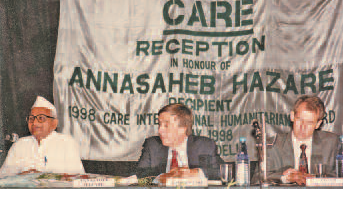
International Care Award (America)
There is no harm in keeping a name. Every person has good and bad qualities and he behaves in society accordingly. People assess him depending on his work and it becomes easier to identify if he is given a name. However, you should not be the reason for misery for others. For example, 45 years have passed and I’ve not entered my home because I feel, why should I go when it is not my possession? So, I don’t feel bad that I don’t visit it. I have received crores of rupees as awards but why should I keep them with me when they do not belong to me? So, I have no cause to be disappointed. Thus, what has remained with me is only happiness.
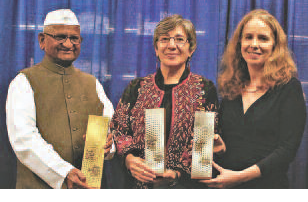
Alard Prize (Canada)
However, since childhood most of us are bought with the attitude of possessiveness and so it is difficult to leave the ‘I, me, myself’ culture, though it is not impossible. This I can tell you from my experience. Because the selfish upbringing has nullified the real identity of the person; in fact a layer has been applied over the real identity of the person. You receive blessings of someone and that brings out your true identity. The more you start being yourself, the more you will derive happiness. So, when you extend your family and your family
encompasses your village, the society and your country, the identity of , me, myself diminishes and it becomes ‘our’ family. Therefore, it is wise to have a large family. While you are pursuing your family responsibilities, take out one or two hours for your village, with a sense
of selfless service. You don’t have to leave your materialistic possessions and familial responsibilities. This may seem difficult but it is not
impossible.
Milk & Agriculture Development
I returned to my village from Alandi. I was inspired by the 14th section of Chapter 245 which states: ‘nagrechi rachavi, jalashaya nirmavi. Mahavane lavavi nanavidh.’ Meaning that you undertake water retention methods to make forests. This is the message given by Sant Dnyaneshwar, 700 years back. I took to putting into action, that chapter of Dnyaneshwari.
My village was a famine-ridden one, where 80% of people had no food to eat. Government tankers used to come during summer, due to shortage of water. The village where villagers would walk for 6 Km in search of work, adopted this one verse of the Dnyaneshwari. This transformed the village. The village which could supply more than 300 liters of milk, started supplying 6000 liters day to the dairy co-operatives, amounting to two lakh rupees turnover per day. Every year, 100 to 125 trucks of onions, vegetables and papaya are sent to wholesale markets for sale. The economy of the village has changed. A village where most of its citizens would go 6 Km far for earning money; now it is not possible to find even four to five labourers for the farm fields of Ralegan Siddhi.

Shri Sant Yadavbaba Milk Co-op. Ltd.
Instead of destroying nature, we used nature’s resources to transform the village. As per that verse in Dnyaneshwari, which stated that you can create your water resource by retention of water, we undertook an extensive watershed development programe and lo and behold, water which was insufficient to irrigate even 300 acres of land for one crop; today, irrigates 1200 acres of land for two crops in a year. Thus, the village economy
underwent transformation.

Orchard (Papaya)
Pomegranate Orchad
Agriculture Devlopment

Pomegranate Orchad
Watermelon Orchad
The problem of unemployment was over. Therefore Sant Namdeo
says “Nama mhane granth shreshtha gyandevi. Ek tari ovee
anubhavavi.’’ There is so much credibility in this one stanza. People from different parts of Maharashtra come to Ralegan Siddhi to get inspired with the transformation of the village, where development and sustainability harmoniously blend. Sant Namdeo says, “Je vruksha lavitee sada sarva kaal. Tayavari chhatranche jhallaal.’’ This means, development which is done by destroying nature is no development but one that is done by furthering the gift of natural resources provided by nature, is the ideal and is sustainable development, as it is pollution free.
Sant Tukaram says: “Vrukshavalli amha soyare vanchare.’’ All saints teach us that forests are the wealth of our surroundings. When you undertake sustainable development, you don’t snatch away the natural resources like you do for petrol, diesel, kerosene and coal. The
saints gave profound importance to natural as well as social environment. Besides serving your village, the society and the nation, to campaign in a non-violent way against social injustice and atrocities is also a kind of social service. Whenever there is injustice on the society and oppression, then we must raise our voice against them. This is the message by our saints. ‘Bhaletar deu kasechi langoti. Nathalache mathee hanu kaathi. Daya tiche nav, bhutanche palan. Aneek nirdalan kantakanche. Mau menahun amhi vishnudas. Kathin vajras bhendu aise’. Which means, one should do agitation in a non-violent way only.
Sant Tukaram and Sant Nilobara had spearheaded an agitation on the banks of the Indrayani River. Inspired by their agitations, I have undertaken agitations for public causes, 20 times. Out of these, three of them were held in Alandi, in front of the Samadhi of Sant Dnyaneshwar. This resulted in the state government being compelled to make laws that are important for citizens. For example, the Right to Information Act, Transfer of Files Act, Lok Adalat, Lokpal and Prohibition of Liquor Act
Visit To Alandi (Pune)

Worship of Sant Dnyaneshwar Maharaj
At the age of 25 years, when I understood that the meaning of life is to selflessly serve, I realised it meant serving my village, the society and the nation. I went to Sant Dnyaneshwar’s Samadhi in Alandi where I lay a tulsi leaf on his Samadhi and put a garland of tulsi around my neck. I paid obeisance and pledged that, the garland around my neck is symbolic of the fact that my entire self is the holy tulsi and I hereby pledge to offer myself in the service of the village, the society and the nation.

Fast leaving with the hands of Hon. Maruti Maharaj Kunhekarji.
I saw the need of opposing changes made to the RTI Act so I started my agitation in Alandi
in front of Sant Dnyaneshwar’s Samadhi. At the time of breaking my agitation, some ministers came to share the moment. I told them I will only break my fast through the persons whose hands are pure. So, I broke my fast at the hands of H.B.P Maruti Maharaj
Kunhekar.
Alandi (Pune) Fast - 1994 & 1999
At Alandi, I visited the Samadhi of Sant Dnyaneshwar. I touched it with a tulsi garland and then put it around me but the divine aura had
still not touched my heart. However, it had given clarity to my intellectual thoughts. I realised that I was facing paucity of the thoughts
of saints as during my youth between 1963 and 1975, I was in the army, busy serving the nation.
Therefore, after put the garland of tulsi around me, after paying obeisance to Sant
Dnyaneshwar’s Samadhi, I decided to ingrain the teachings and philosophy of various saints of Maharashtra. So, four months of the year I would spend at Pandharpur where I came in touch with several Sadhus who had ingrained the thoughts of our Ancient Saints. For that I would reside in Pandharpur for those four months. Every morning, I used to
bathe in the Chandrabhaga River, visit the sanctum sanctorum of Vitthal Temple, attend lectures rendered by Saints and attend kirtans which, in common language, narrated the
thoughts of the saints. Every evening, I used to pay my respects to Lord Vitthal by going around the sanctum sanctorum and do meditation. My year was divided thus – eight months in the selfless service of people and four months, concentrate on spirituality and
thoughts of Saints.

Alandi (Pune) Fast – 1999
For six years, my intellectual and spiritual pursuit was noteworthy. Slowly and steadily, I began understanding the meaning of life. Some people took my Pandharpur sojourn as a tryst with superstition. However, I’ve proved that it is not any symbolism. I don’t chant the beads of the tulsi leaves for namesake, blindly, for Sant Tukaram says, “mala toh kar mein fire, jeebh feere mukhya mahi, manva toh chau disha firai, yaha toh sumirannahi.’’ I try to find God in those who are suffering and are miserable. Serving them is like serving God and that is what I chant so that in reality, I can serve them. There are a large number of people who are suffering but I tried to address the woes of as many as I can. Therefore, I personally experience that my happiness is endless. Perhaps, if I had restricted to chanting and meditation, I would have done good to myself alone. However, saints say that “apan tarla te navhe taran uddaran. Lokas lavi sanman purna. Tochi tarla purna pane.” To engulf yourself in spirituality is also selfishness. We should always thinkof the society at large.

Alandi (Pune) Fast – 1994

Worship of Sant Dnyaneshwar Maharaj
The profound thoughts of the Saints can inspire and counter the society which has gone wayward today. Also, because; we have now entered the orbit of Science. Today, man has reached the moon; tomorrow he may land on any other planet. Although science has reached the orbit but if spirituality does not reach the orbit of man’s heart, then science will trick man of progress and destruction of man will be inevitable. Today, science has made spectacular progress but at the same time, the world is worried that, at the press of a button, the world can be destroyed. Do we really need this kind of scientific
progress? It’s only because we have not allied scientific progress with spirituality that we have reached this level of destructive ability. Hence, the need of the hour is a harmonious blend of science and spirituality.
Thanks to the four month ‘chaturmaas’ that I undertook in Pandharpur, I could control my temptation of wealth and worldly desires and make my firm resolve to dedicate my life to the service of the village, the society and the nation. And that, I would serve without any expectations. This also made me realise that worldly pursuit is a kind of illness and selflessly serving the society is the best form of sacrifice. Because of the pursuit of selfless service, there is no need of taking anyone’s obligation or favour; just keep relentlessly pursuing the spirit of selfless service for the village, society and the nation. For the basic needs of life, my pension is sufficient so I’m not a burden on anyone.

While going to Yerwada Jail (Pune)
I have undertaken village development projects to the tune of several lakhs of rupees but I was never tempted to take even five rupees out of it. In order to have complete transparency in life, I’ve never kept passbook of my bank account with me. The expenditure of money from the bank is for all to see. That’s because being transparent in life and being above suspicion is very important. I’m a very God fearing man and my only wish is that I don’t witness anyone’s sorrow. I’ve no other wish to make to God. Many a time I’ve been slighted, humiliated and opposed but I was never distressed. Sometimes, some political leaders, as revenge, brought out false allegations of corruption and sent me to jail but yet I was not disheartened. I understood that people stone that very tree that bears fruit. There is no question of stoning a tree that has no fruits on it. The number of stones that people throw on mango trees is much more compared to those thrown on Babhali trees. Saints have said that ‘your critics should be your neighbours.’ For me, selfless service is like worship to God. I will continue to do this until my last breath as it has become my passion now. People are chasing happiness; but I’ve got immense happiness within me. If you ask a man who has eaten sugar, as to how sweet it is, he will answer that it is very sweet. That though does not tell the other person the degree to which it is sweet unless he himself tastes it. Similarly, happiness cannot be expressed; it
has to be felt within you.
Agitation Against Corruption
To ensure progress of developmental works and to curb corruption are two sides of the same coin. As I undertook developmental works, I found that much of the funds for it are siphoned off due to corruption. Instead of reaching the poor for whom the funds are
earmarked for, some wealthy middleman is usurping it and taking it home. Hence, the quality of developmental works is very poor. Unless
you stop corruption, you will not get the required output of the projects.
So, I began developmental works for the village in 1975 and in 1990, in whichever department I could smell corruption, I ordered an investigation. I gave them an ultimatum that if inquiry is not ordered, I
would undertake agitations through fast and silence in non-violent ways. As I undertook agitations simultaneously throughout Maharashtra, the government came under pressure.


Due to rise of corruption, prices were rising and the direct victims were the poor people. Despite it being the right of the people to get public works done, they had to bribe the relevant officers and this had frustrated them. A public agitation was very much on their minds. Hence, I received good response to my public agitation. In 1997, I registered with the charity commissioner, a charitable organisation by the name of ‘Bhrashtachar virodhi jan andolan nyas’ (platform of public agitation against corruption). This would allay any suspicion of corruption charges. I started public agitations solely as a service to the society, state and nation, without any expectation. My mission was only to serve the people.
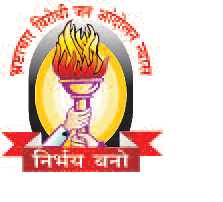
Since executing developmental works and curbing corruption are the same sides of the coin, unless both are undertaken simultaneously, there is no hope of a bright future for the village, the society and the nation. Initially, some people thought that I was fighting against a particular political party. Even the person who I agitated against saw it as a personal revenge on him. It’s like the readymade clothes which are not stitched to the specifications of a particular individual but if he wears it and it fits well, he begins to believe that it has been customised for his body’s specifications. Because of my agitation, the government was compelled to undertake investigation, nail the culprit and take action on him. When proof was found of financial irregularities, six ministers, across various political parties, were sent back home. More than 400 officials were suspended. There was a notable curb on corruption by the government. However, I realised that it is of no use ifonly political leaders and government officials are punished.
Our country runs on laws. Strong laws can curb corruption and so we should have laws like the Right to Information Act. Delay in the moving of files, Citizens’ Charter and more powers to the Gram Sabha are some of the ten laws that the government brought in, to curb
corruption. To decrease corruption and to strengthen democracy, no matter which government is in power, it is imperative that there should be pressure of citizen power. For this, our Constitution has given us the right to hold non-violent agitations. Dr Babasaheb Ambedkar has scripted such a powerful constitution but the activists and the people do not bother to read it or study it. Therefore, I decided to undertake public tours throughout Maharashtra and to several other states of the country for public awareness and public awakening.


I undertook tours throughout Maharashtra but never had bank balance in my account. During my public tours, I used to have two diesel vehicles and 10 to 12 volunteers and couldn’t afford the expenditure for fuel and for volunteers’ food and overnight stay. So, after every public speech, I would humbly stretch my jholi, appealing to people to donate five, ten or 15 rupees in order to curb corruption. I used to collect some money at every public gathering. I used to immediately declare, the amount collected. Generally, I used to receive between Rs. 2,000 to Rs. 5,000. I had adopted so much transparency for these donations that not a rupee also was unaccounted for. This used to be deposited in the trust’s bank account and every work would be undertaken with a receipt. So, no one had the opportunity to point a finger at me. However, just like you see the world depending on which coloured spectacles you wear, some people saw motives in my work and tried to point fingers at me but did not succeed.
Because I undertook public rallies continuously for 10 years, there was public awakening and education. I established branches of the trust in 22 districts and 252 talukas, which had volunteers. The strength of the organisation brought pressure on the government. Therefore, it was forced to make the 10 citizen-empowering laws. Therefore, the social activists who want to fight against corruption should first build an organisation of volunteers. Unless an organisation is set up, you can’t create a citizen pressure group. The bigger is the organisation, the more powerful is the citizen pressure on the government. It is the duty of every social activist to bring pressure on the government and to do so, they must mobilise people to support them.

The money collected in the government treasury is peoples’ money. Since the elected representatives and government officials are the servants of the people, it is the mandatory duty of the people to know where the public expenditure has been made. Despite providing proof of corruption and financial irregularities and corruption, when the government does not take any action, then the decision is taken to hold agitations, rallies and fasts. Hundreds of people used to participate in them. Sometimes even after public agitations and morchas, the government would not take cognisance. Thus, I used to resort to indefinite fasts and I’ve undertaken 20 of them so far.
Jan Lokpal & Lokayukta Act
While I was undertaking agitations for various causes in the state of Maharashtra, there was a need to curtail corruption by bringing in the Lokpal and Lokayukta Act. For this, I held nationwide agitations in Delhi in April 2011, August 2011 and March 2018. In 2011, the entire
nation stood by me during the public agitation at Ramlila Maidan which lasted 13 days. In the 45 year period from 1966 to 2011, the Lokpal Bill was introduced in the Parliament eight times but was not passed. There was mass public awareness about these laws due to the public agitation in Ramlila Maidan.
On 16th August, 2011, the government had to call for a special parliamentary session in which the Lokpal and Lokayukta Bill was passed. Corruption has not been curbed due to the public agitation in Ramlila Maidan but it achieved colossal public awareness and education, which would not have been achieved even if the government had spent crores of rupees on such a campaign.

Public Participation at Delhi in – 2011

Candle March at Ralegan Siddhi
However, after this successful public agitation, untoward elements entered the fray and brought a bad reputation to it. Therefore, I suspended all committees in the State because we wanted to ensure that the credibility of the organisation was maintained. The 2011 Delhi agitation had been very successful and received overwhelming response and participation by the public so it seemed as
if true democracy was just round the corner. Because, after India’s Independence, due to formation of political parties and party politics, true democracy was kept away from the people. The only difference was that the White people who ruled us exited and Brown people usurped that rule. However, in 2011, it seemed that we are at the gateway of true democracy as Team Anna had won the confidence of the people. Now, Team Anna would campaign throughout the country and create public awareness and education on pursuing democracy beyond political parties and party politics. That would strengthen our democracy. However, due to a split in Team Anna in which several members walked out, the dream of true democracy remained a mirage. truly felt that after the national agitation, the country will be up on its feet once again. There was lack of funds to tour the country to create public awareness. I thought, some social activists will come forward and ponder about what to do next. Unfortunately, no one came forward and due to lack of funds it was not possible for me to undertake a nationwide tour.
So, the dream of India’s second Independence and peoples’ democracy remained unfulfilled. Anna Hazare is a fakir but this unfulfilled dream has adversely affected the people of India. In the 90 years period, from 1857 to 1947, all the freedom fighters who sacrificed their lives so that we may attain freedom, always envisioned a democracy which is by the people, of the people and for the people. Political parties and party politics took the place of democracy and our democracy has become – of the political parties, by the political parties and for the political parties. Even today, I’ve not given up hope. I’m wondering whether it is possible to form a nationwide organisation of apolitical people with good character which would form a pressure group to cleanse the present self-centred and selfish political system. This is the only alternative that I see before me. Otherwise, though, bereft of money and power; all that God did through a man like me who lives like a hermit, should easily form the pillar of support and
inspiration for social activists, I think. I think a good solution to today’s state of affairs is that a powerful citizen pressure group has the ability to scuttle those who have made our Independence synonymous with self-centredness and selfishness.

Social Awareness Tours
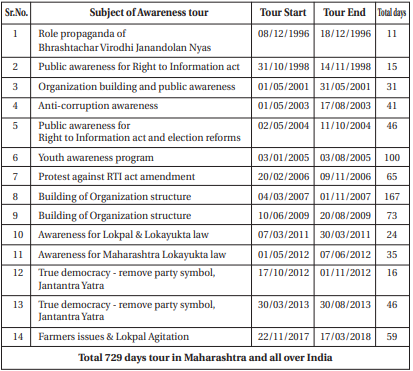
Fasting For Public Interest Tours
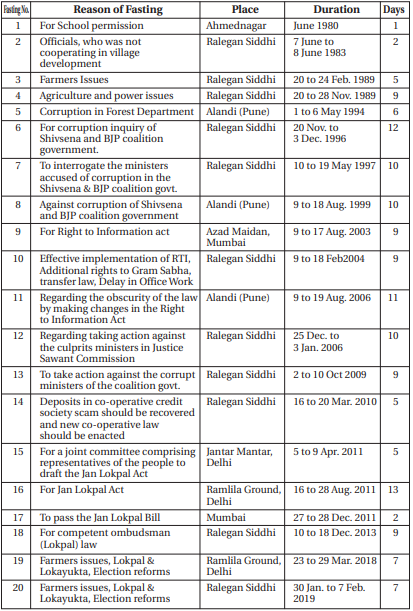
Tours In Other States
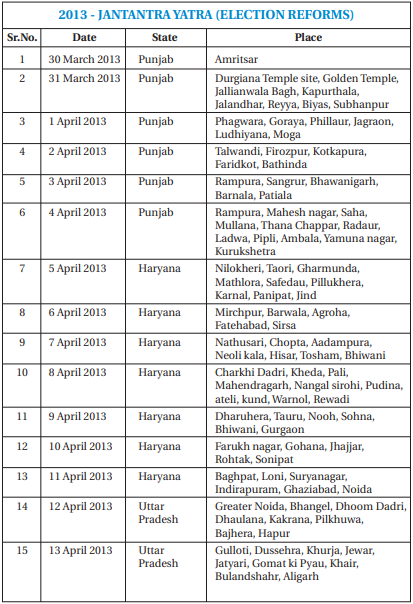
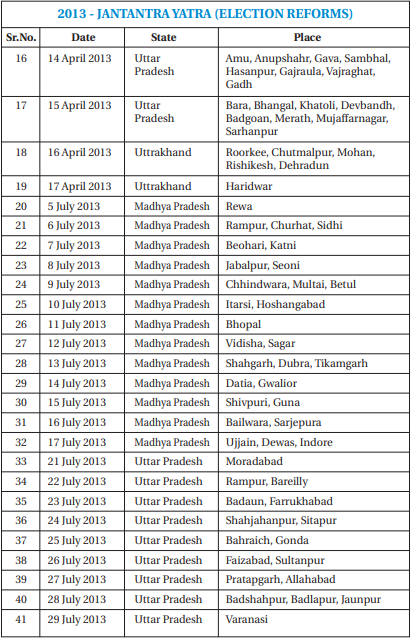
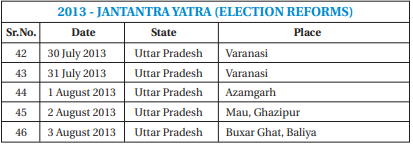
Agitation At Ramleela Ground - 2018
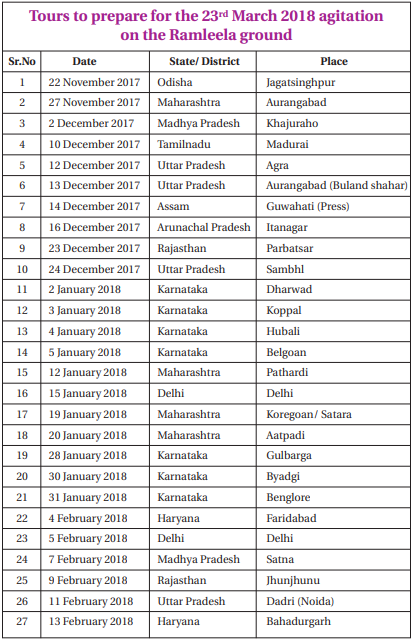
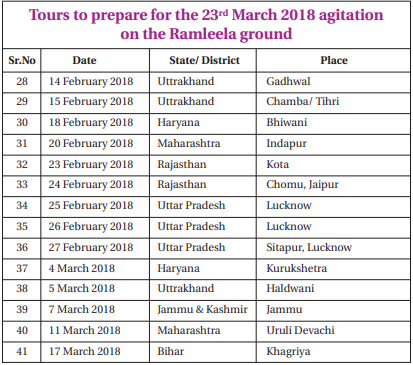
Self - Pride Is Important!
A person like me, made a resolve and a goal at the young age of 25 years. Therefore, I could conquer death. If you overcome fear, are
ready to relentlessly toil and decide to lead a life of high self-esteem, like I did, you can see for yourself how much a youth can do for his village, the society and the nation. Several youngsters make a resolve in their lives and keeping their character intact; do good work for the society. However, their resolve is confined to the philosophy of ‘I, me and myself.’ Other youngsters have no goals in life; they only binge and seek entertainment and one day, die. That’s their only resolve. If you only live to eat, then what is the difference between a man and an animal? Living an animal-like life is no life at all. Some youngsters live with self-esteem but others live a life of compromise and I feel bad about it. Those who do ‘yes sir’ to leaders who are worthless are stooges. They forget that their value is much more than the worthless leader, and hence they play the role of cronies. The parrot can fly very high. However, when the parrot sits atop a pipe, it envisions that if the pipe rolls over, it will turn upside down. So, as a pre-emption and prevention, it holds the pipe tightly with its toes.
It forgets that in case the pipe rolls over she would be able to immediately take to her wings and fly high; but it forgets the innate
strength that it is born with. This is what has happened to many youngsters – despite having the capacity to independently blossom on
their own, they take to the path of sycophancy. I’ve experienced that despite having no wealth or power, I never took to a life of sycophancy and compromise. If I had led such a life, I would not have been able to achieve anything in life. I nurtured self-respect and self-esteem; therefore I could achieve something in life.
